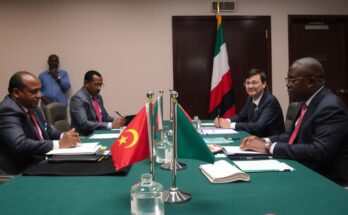India has raised concerns over Sudan’s deteriorating security situation, particularly following an attack on the UAE Ambassador’s residence. The MEA emphasized the importance of respecting diplomatic premises and international laws during conflicts. The ongoing violence reflects strife between military factions in Sudan, with the UAE condemning the attack and signaling potential diplomatic repercussions. India’s position highlights the global community’s collective commitment to uphold diplomatic protections in crisis areas.
In light of the deteriorating security situation in Sudan, the Government of India has expressed grave concerns regarding incidents affecting diplomatic missions, particularly following an attack on the residence of the United Arab Emirates (UAE) Ambassador in Khartoum. The Ministry of External Affairs (MEA), represented by Official Spokesperson Randhir Jaiswal, has stressed the urgent need to maintain the inviolability of diplomatic premises in accordance with established international diplomatic norms, particularly amidst the rising tensions of the ongoing conflict. During a media interaction, Mr. Jaiswal stated, “We are following the security situation in Sudan. The inviolability of diplomatic premises in any conflict must be respected, and reports of the attack on the residence of the UAE Ambassador in Khartoum are of serious concern.” This deterioration in security arises from escalating hostilities between the Sudanese Armed Forces and the paramilitary Rapid Support Forces (RSF), resulting in widespread instability and violence, chiefly in Khartoum. A notable escalation in the conflict was reported when a military aircraft struck the UAE Ambassador’s residence, causing significant damage. The UAE has publicly condemned this attack, labeling it a “heinous” violation and demanding accountability from the Sudanese military. This incident further complicates Sudan’s already strained relations with the UAE, which has historically played a pivotal role in the region, particularly after the ouster of former President Omar al-Bashir. Despite the Sudanese military’s denial of involvement, the allegations against it reflect a growing rift with the UAE, which has been accused of providing support to the RSF. The UAE’s engagement in Sudan aligns with its broader strategic interests in the Red Sea, where it seeks to counterbalance the influence of other powers, including Iran. This position makes the UAE a significant player in Sudanese internal conflicts, complicating the geopolitical landscape in the region. India’s stance underscores a shared international concern over the protection of diplomatic entities in conflict zones. The principles outlined in the Vienna Convention on Diplomatic Relations, which mandates that diplomatic missions are to be safeguarded at all times, even during conflicts, must be adhered to. Incidents such as the attack on the UAE residence constitute serious breaches of international law and risk escalating diplomatic tensions further. The UAE government has announced its intent to present this matter to the League of Arab States, the African Union, and the United Nations, in pursuit of a concerted response to these violations of diplomatic norms, as the global community remains vigilant about the possibility of increased regional instability. As the conflict in Sudan intensifies, the security and protection of diplomatic missions become paramount. India’s call for respect toward diplomatic premises highlights the critical importance of adhering to international conventions during periods of unrest. The unfolding situation remains precarious, likely prompting enhanced diplomatic dialogues as nations endeavor to uphold their interests while striving for stability in the region.
The backdrop of this situation involves escalating violence in Sudan, where conflicts primarily between the Sudanese Armed Forces and the paramilitary RSF have wreaked havoc. The hostilities have intensified following the failure of negotiations among the military factions, resulting in extensive clashes across Khartoum and other areas. The involvement of external entities such as the UAE has further complicated these dynamics, given its historical support to various factions within Sudan after the deposition of al-Bashir. Furthermore, the protection of diplomatic missions is not only a matter of national interest but also a reflection of the commitment to international law, particularly under the Vienna Convention.
In conclusion, the recent incidents regarding the security of diplomatic missions in Sudan, especially the attack on the UAE Ambassador’s residence, underscore the urgent need for adherence to international diplomatic norms. The Government of India has echoed these concerns, advocating for the respect of diplomatic premises amidst rising violence as the situation in Sudan continues to evolve. As global powers monitor these developments, the potential for diplomatic fallout remains a pressing issue that demands immediate attention.
Original Source: www.indianewsnetwork.com




